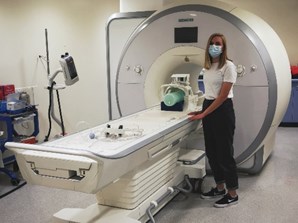Imogen Thrussell

Imogen Thrussell is carrying her PhD in the Division of Radiotherapy and Imaging at the ICR. She is investigating how AI can be combined with advanced MRI techniques to improve the assessment of radiotherapy response in soft-tissue sarcomas (STS).
What is your educational/work background?
I completed an MPhys at Oxford University, specialising in atmospheric and ocean physics and condensed matter physics. I then briefly worked in a space lab measuring meteorite compositions before coming to the ICR.
Why did you want to study at the ICR?
I was drawn to the ICR because of its partnership with The Royal Marsden. My project involves working closely with clinicians and clinical scientists so not only do I benefit from their expertise and experience, I know my work is tailored towards the needs of medical professionals and it will get translated quickly from research to clinical practice.
Talk us through your typical day
My days are made up of coding and data analysis, developing MR protocols, testing new equipment, collecting patient or test-object data, meetings with collaborators and reading papers and journals.
What big projects are you working on?
My project involves helping to run a clinical imaging trial. We’re testing several quantitative MR methods and collecting pathological response measures following radiotherapy to assess the imaging markers.
I’m currently working with a summer student to develop and test an MR elastography protocol, where we use low-frequency vibrations to measure the mechanical properties of tissue, which we hope to add to the trial.
What are you most proud of?
Going from working in a quiet physics lab to helping run an imaging trial in a busy clinical environment, in the middle of a pandemic, has been a steep learning curve!
What’s the best thing about working at the ICR?
I’ve met some incredible researchers and medical professionals, at both the ICR and The Royal Marsden, who are dedicated to their work and improving lives. They’re inspiring to be around.
How do you take part in life at the ICR outside your studies?
I’m currently President of the student committee. I’m also a student wellbeing advisor, have given public engagement talks and presented at the Discovery Club. I’m also the self-designated head of frivolity in my research team.
What’s your favourite part of life at the ICR?
Through my project and in the committee, I’ve met a lot of incredible, hardworking and dedicated people. It’s inspiring to have met so many people who are working to improve people’s lives – and I am sure I’ll create lots of long-lasting friendships.
What opportunities has studying at the ICR given you?
I’ve learnt how to develop MR protocols, improved my coding and data analysis skills, presented at an international conference, gained experience working in clinical trials and I’m currently supervising a summer student. I’ve also developed my management and leadership experience through my work with the student committee and carried out public engagement activities.
What do you do to unwind in your spare time?
Phone my mum and dad, hang out with friends, go skating.